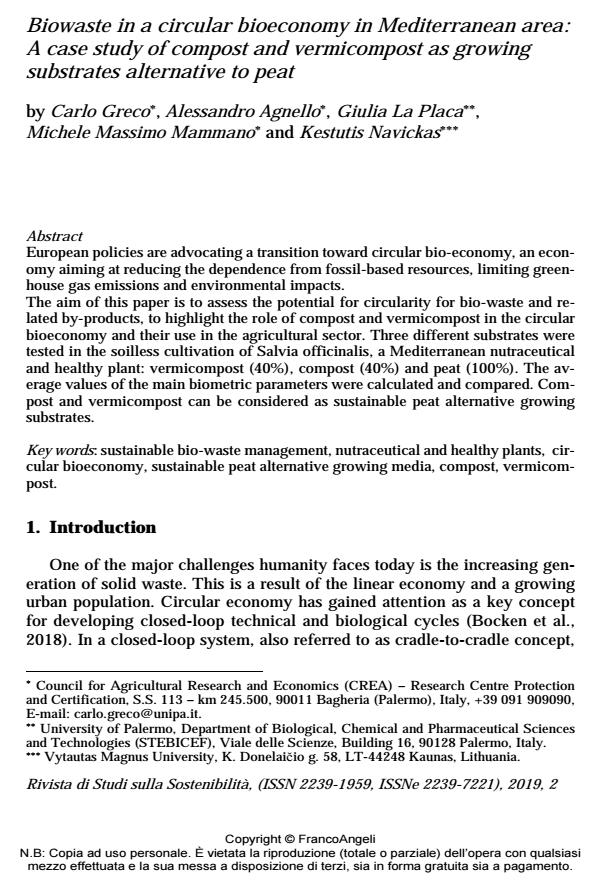Biowaste in a circular bioeconomy in Mediterranean area: A case study of compost and vermicompost as growing substrates alternative to peat
Titolo Rivista RIVISTA DI STUDI SULLA SOSTENIBILITA'
Autori/Curatori Carlo Greco, Alessandro Agnello, Giulia La Placa, Michele Massimo Mammano, Kestutis Navickas
Anno di pubblicazione 2020 Fascicolo 2019/2 Suppl.
Lingua Inglese Numero pagine 18 P. 345-362 Dimensione file 194 KB
DOI 10.3280/RISS2019-002-S1022
Il DOI è il codice a barre della proprietà intellettuale: per saperne di più
clicca qui
Qui sotto puoi vedere in anteprima la prima pagina di questo articolo.
Se questo articolo ti interessa, lo puoi acquistare (e scaricare in formato pdf) seguendo le facili indicazioni per acquistare il download credit. Acquista Download Credits per scaricare questo Articolo in formato PDF

FrancoAngeli è membro della Publishers International Linking Association, Inc (PILA), associazione indipendente e non profit per facilitare (attraverso i servizi tecnologici implementati da CrossRef.org) l’accesso degli studiosi ai contenuti digitali nelle pubblicazioni professionali e scientifiche.
European policies are advocating a transition toward circular bio-economy, an economy aiming at reducing the dependence from fossil-based resources, limiting greenhouse gas emissions and environmental impacts. The aim of this paper is to assess the potential for circularity for bio-waste and related by-products, to highlight the role of compost and vermicompost in the circular bioeconomy and their use in the agricultural sector. Three different substrates were tested in the soilless cultivation of Salvia officinalis, a Mediterranean nutraceutical and healthy plant: vermicompost (40%), compost (40%) and peat (100%). The average values of the main biometric parameters were calculated and compared. Compost and vermicompost can be considered as sustainable peat alternative growing substrates.
Parole chiave:Sustainable bio-waste management, nutraceutical and healthy plants, circular bioeconomy, sustainable peat alternative growing media, compost, vermicompost.
Carlo Greco, Alessandro Agnello, Giulia La Placa, Michele Massimo Mammano, Kestutis Navickas, Biowaste in a circular bioeconomy in Mediterranean area: A case study of compost and vermicompost as growing substrates alternative to peat in "RIVISTA DI STUDI SULLA SOSTENIBILITA'" 2 Suppl./2019, pp 345-362, DOI: 10.3280/RISS2019-002-S1022